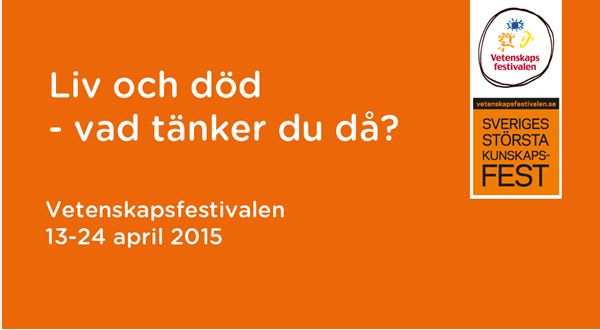
Vetenskapsfestivalen – forum för forskningskommunikation 15 april
Kom och inspireras och dra lärdom av framstående experter inom forskningskommunikation! Storbritannien är ett föregångsland när det gäller samverkan mellan forskare, samhället, media och politiker. Vad kan vi lära oss av våra brittiska kollegor? Ta del av och diskutera kring det bästa Storbritannien har att erbjuda!
PROGRAM
12:30
Registration
13:00
Welcome!
Anna Maria Fleetwood, Vetenskapsrådet
Stefan Örgård, Vetenskapsfestivalen
Opening up Research: a quiet revolution
Paul Manners talk will explore, for instance, attempts to change the culture of research – to value public engagement not just publication for one’s academic peers; new approaches to assessing the social impact of research; attempts to build ethical and social considerations in to the setting of research agendas; and exciting new models of career development for researchers.
Paul Manners, Director National Coordinating Centre for Public Engagement
Science and the Media – the view from the front line
The main remit of the Science Media Centre is to help restore public trust in science by persuading more scientists to engage more effectively with the big controversial science stories that hit the headlines, and over the last 10 years the SMC has earned huge praise and respect from those who use its services.
Fiona Fox, Chief Executive, Science Media Centre
14:45
Afternoon tea
15:15
Science in the UK Parliament
Most parliamentarians do not have a scientific or technological background but science and technology issues are increasingly integral to public policy. By writing briefings, organising events and assisting Select Committees, the Parliamentary Office of Science and Technology have supported parliamentarians in their decision-making since 1989.
Chris Tyler, Director of the UK’s Parliamentary Office of Science and Technology, POST
What no cat videos? A science communication guide to working on You Tube
As You Tube turns 10 this year, it’s perhaps a good opportunity to take a look at how the science communication community has (or has not) embraced online video as a means of communicating science. With over 300 hours of video uploaded every minute, it’s been hailed as a great example of democratisation. It’s also been derided for its triviality. So, what makes a good science video? And, aside from numbers of views, how would you know? What are the myths and realities?
Dr Gail Cardew, Director of Science and Education at the Royal Institution
17:00–17:30
Panel discussion: Q&A
Moderators
Anders Sahlman, Vetenskap & Allmänhet
Helena Bornholm, Vetenskapsrådet
About the speakers
Paul Manners is Associate Professor in Public Engagement at the University of the West of England and director of the National Coordinating Centre for Public Engagement. The NCCPE’s role is to help to coordinate public engagement practice and to support innovation and strategic change in universities across the UK. The NCCPE is widely recognised for its expertise in supporting organisational change, partnership working, impact assessment and innovation in engagement. Previously, Paul taught English in secondary schools before joining the BBC where he was an executive producer and managed national educational campaigns.
Fiona Fox has a degree in journalism and 25 years of experience in working in media relations for high profile national organisations. Her career includes stints working for the Equal Opportunities Committee, National Council for One Parent Families, and CAFOD (a leading aid agency), before her current role as Chief Executive of the Science Media Centre which opened in April 2002. Other than her dedication to the SMC, Fiona was chair of the Department for Business, Innovation and Skills Working Group that published a report on the future of science in the media in January 2010 as part of the UK’s Science and Society strategy. She was the only representative of the science community to appear as a witness at the Leveson Inquiry and blogs and comments regularly on science in the media.”
Dr Chris Tyler is Director of the UK’s Parliamentary Office of Science and Technology (POST). He joined POST in 2012 having spent the previous two years as Executive Director of the Centre for Science and Policy (CSaP) at the University of Cambridge. Before that, Chris worked at the House of Commons, where he was science adviser to the Science and Technology Select Committee, and Sense About Science, a charity promoting science in public debates.He has a degree in anthropology from the University of Durham and a PhD in biological anthropology from the University of Cambridge. He sits on the Board of the Campaign for Science and Engineering (CaSE) and is an Honorary Senior Lecturer in University College London’s Department of Science, Technology, Engineering and Public Policy (UCL STEaPP).
Dr Gail Cardew is Director of Science and Education at the Royal Institution, where she is responsible for the strategic development of the Royal Institution’s science communication, science education and science policy activities. She is also Chair of the board that governs the strategic direction of the Euroscience Open Forum and selects host cities – the ESOF Supervisory Board, as well as a member of the Advisory Board for the Gothenburg Science Festival, the AXA Scientific Search Committee, the European Institute of Science and Society and the Editorial Board of the Euroscientist. From 2006–2012 she was Vice President of Euroscience, and in 2012 she sat on the Canadian Foundation for Innovation Multidisciplinary Assessment Committee.
Datum:
Onsdagen den 15 april kl. 13.00 – 17.30
Plats:
Kajskjul 8
Ort: Göteborg
Pris: Kostnadsfritt
Anmälan senast:
15 mars 2015
Arrangör:
Forum för Forskningskommunikation arrangeras av Vetenskapsfestivalen i samarbete med forskningsråden Formas, Forte, Vetenskapsrådet och VINNOVA samt KK-stiftelsen, Mistra, Stiftelsen för strategisk forskning och Vetenskap & Allmänhet.
Seminariespråket är engelska.
Anmäl dig här: https://formogr.am/kDQiOxWhlf
Tipsa gärna dina kollegor – seminariet är öppet för alla som är intresserade av forskningskommunikation. Frågor besvaras av Angelica Borefur, ansvarig för Vetenskapsfestivalens fackprogram, angelica.borefur@goteborg.com, 031-368 42 91.